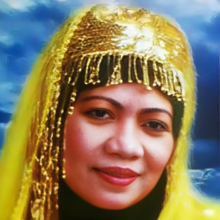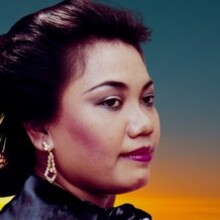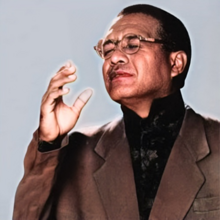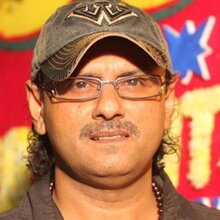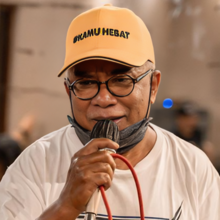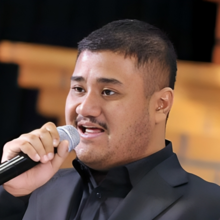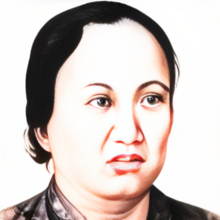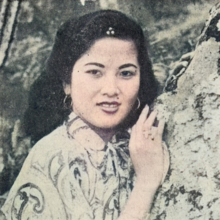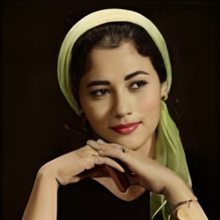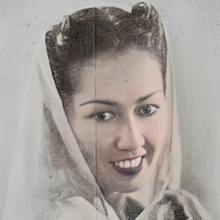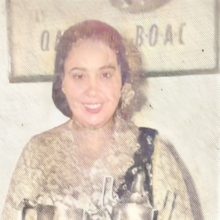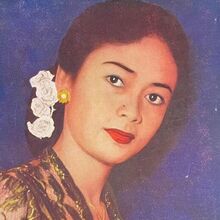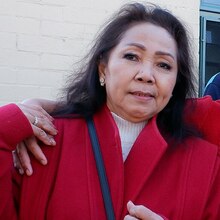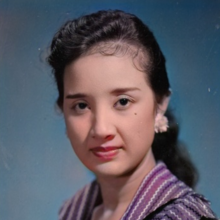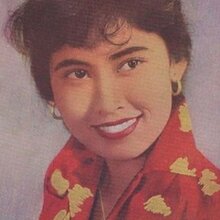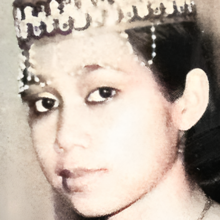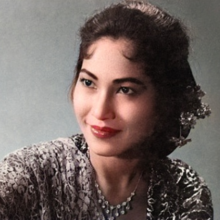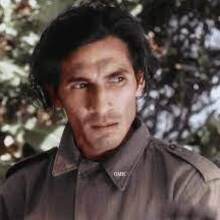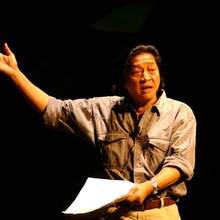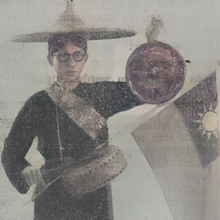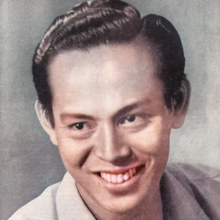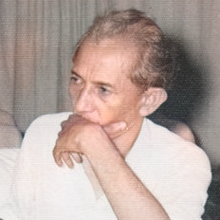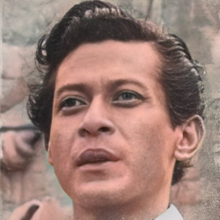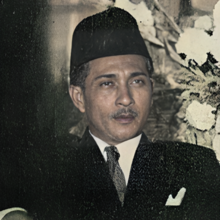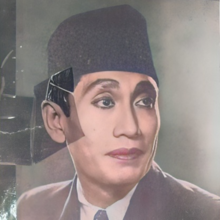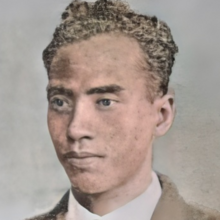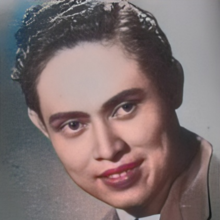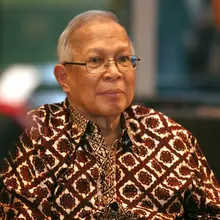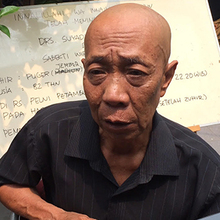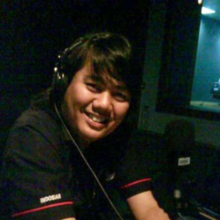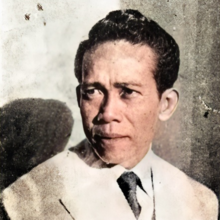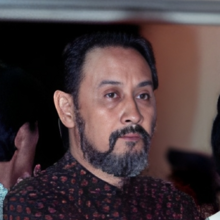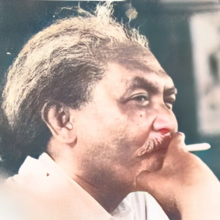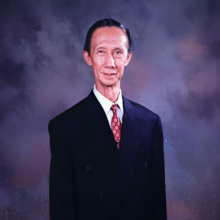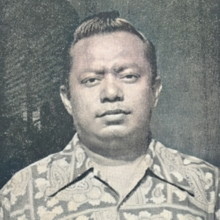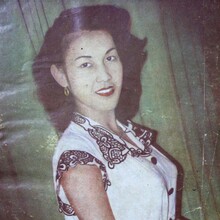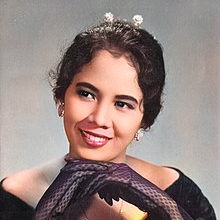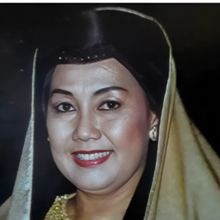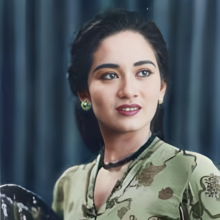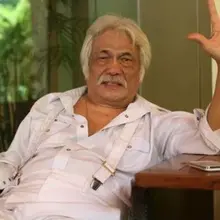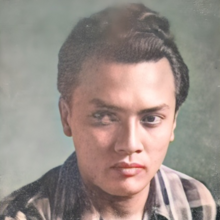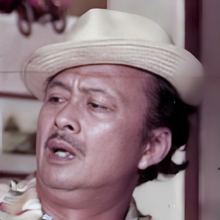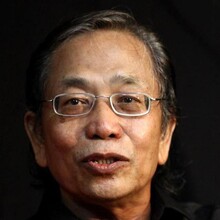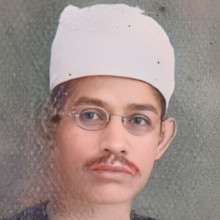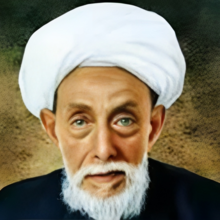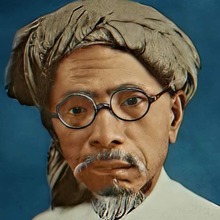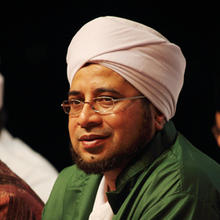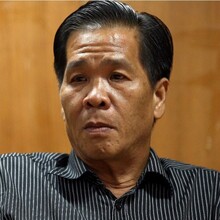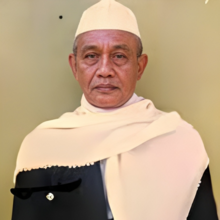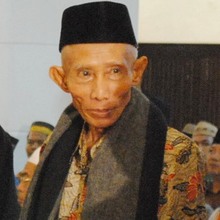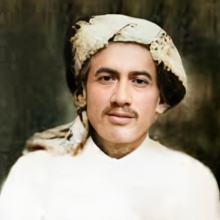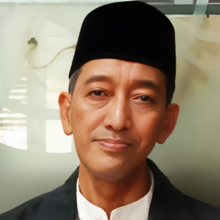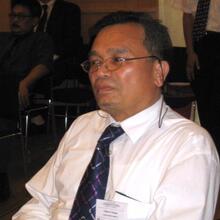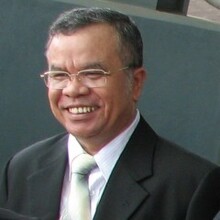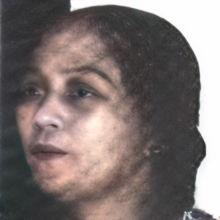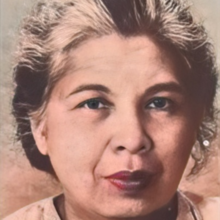 Ibnu Sutowo
1914 - 2001
President Director of Pertamina
Ibnu Sutowo
1914 - 2001
President Director of Pertamina
 Rempo Urip
1918 - 1987
Film director promoter of traditional art forms
Rempo Urip
1918 - 1987
Film director promoter of traditional art forms
 Suharto
1921 - 2008
Second president of Indonesia
Suharto
1921 - 2008
Second president of Indonesia
 Ahmad Syech Albar
1946 - 2021
Rock singer and vocalist of God Bless
Ahmad Syech Albar
1946 - 2021
Rock singer and vocalist of God Bless
 Djamaluddin Adinegoro
1904 - 1967
Press pioneer and political analyst
Djamaluddin Adinegoro
1904 - 1967
Press pioneer and political analyst
 Willibrordus Rendra
1935 - 2009
Poet, dramatist, activist, performer, actor
Willibrordus Rendra
1935 - 2009
Poet, dramatist, activist, performer, actor
 Abdul Hamid
1948 - 2022
Voice actor, puppeteer, comedian
Abdul Hamid
1948 - 2022
Voice actor, puppeteer, comedian
 Elly Yunara
1923 - 1992
Actress and producer
Elly Yunara
1923 - 1992
Actress and producer
 Mike Mohede
1983 - 2016
Vocalist of Kahitna
Mike Mohede
1983 - 2016
Vocalist of Kahitna
 Abdullah Totong Mahmud
1930 - 2010
Children's song composer
Abdullah Totong Mahmud
1930 - 2010
Children's song composer
 Artati Marzuki Sudirdjo
1921 - 2011
Indonesia's first labor minister
Artati Marzuki Sudirdjo
1921 - 2011
Indonesia's first labor minister
 Chrisye
1949 - 2007
Progressive pop singer and songwriter
Chrisye
1949 - 2007
Progressive pop singer and songwriter
 Umi Sardjono
1923 - 2011
Head of Gerakan Wanita Indonesia
Umi Sardjono
1923 - 2011
Head of Gerakan Wanita Indonesia
 Ali Maksum
1868 - 1923
Islamic leader and revivalist
Ali Maksum
1868 - 1923
Islamic leader and revivalist
 Usman bin Yahya
1822 - 1913
Islamic scholar and Grand Mufti of Batavia
Usman bin Yahya
1822 - 1913
Islamic scholar and Grand Mufti of Batavia
 Nani Soedarsono
1928 - 2011
Indonesia's first Minister of Basic Education
Nani Soedarsono
1928 - 2011
Indonesia's first Minister of Basic Education
 Ali Sastroamidjojo
1903 - 1975
Prime Minister of Indonesia
Ali Sastroamidjojo
1903 - 1975
Prime Minister of Indonesia
 Bachtiar Effendi
1903 - 1976
Film actor and director
Bachtiar Effendi
1903 - 1976
Film actor and director
 Suzzanna
1942 - 2008
Queen of Indonesian horror
Suzzanna
1942 - 2008
Queen of Indonesian horror
 Bob Hasan
1931 - 2020
Real estate developer
Bob Hasan
1931 - 2020
Real estate developer
 Ami Priyono
1939 - 2001
Film director and actor
Ami Priyono
1939 - 2001
Film director and actor
 Umi Dachlan
1942 - 2009
Pioneering Indonesian painter and art lecturer
Umi Dachlan
1942 - 2009
Pioneering Indonesian painter and art lecturer
 Toeti Heraty
1933 - 2021
Poet, academic, and activist
Toeti Heraty
1933 - 2021
Poet, academic, and activist
 Mohammad Sarengat
1939 - 1968
100-meter sprinter
Mohammad Sarengat
1939 - 1968
100-meter sprinter
 Aedy Moward
1929 - 1980
Actor and custom employee
Aedy Moward
1929 - 1980
Actor and custom employee
 Ida Laila
1943 - 2019
Singer of dangdut and Malay music
Ida Laila
1943 - 2019
Singer of dangdut and Malay music
 Ali Sadikin
1926 - 2008
Governor of Jakarta and Major General
Ali Sadikin
1926 - 2008
Governor of Jakarta and Major General
 Melky Goeslaw
1947 - 2006
Singer and boxing manager
Melky Goeslaw
1947 - 2006
Singer and boxing manager
 Amir Sjarifuddin
1907 - 1948
Prime Minister of Indonesia
Amir Sjarifuddin
1907 - 1948
Prime Minister of Indonesia
 Harry Roesli
1951 - 2004
Musician, composer, and activist
Harry Roesli
1951 - 2004
Musician, composer, and activist
 Sudharmono
1927 - 2006
Speaker of the People's Consultative Assembly
Sudharmono
1927 - 2006
Speaker of the People's Consultative Assembly
 Idham Chalid
1908 - 1981
Islamic scholar, philosopher, novelist, lecturer
Idham Chalid
1908 - 1981
Islamic scholar, philosopher, novelist, lecturer
 Hurustiati Subandrio
1918 - 1974
Parliament member of Indonesia
Hurustiati Subandrio
1918 - 1974
Parliament member of Indonesia
 Hamengkubuwono IX
1912 - 1988
Deputy Army chief-of-staff
Hamengkubuwono IX
1912 - 1988
Deputy Army chief-of-staff
 Titien Sumarni
1932 - 1966
Actress and producer
Titien Sumarni
1932 - 1966
Actress and producer
 Paku Alam VIII
1910 - 1998
Regent of Suppa and Batavia, member
Paku Alam VIII
1910 - 1998
Regent of Suppa and Batavia, member
 Sudirman Arshad
1954 - 1992
Singer and songwriter
Sudirman Arshad
1954 - 1992
Singer and songwriter
 Mohammad Husni Thamrin
1894 - 1941
Member of the Volksraad and leader
Mohammad Husni Thamrin
1894 - 1941
Member of the Volksraad and leader
 Achmad Nungcik Alcaff
1925 - 1987
Actor, director, activist
Achmad Nungcik Alcaff
1925 - 1987
Actor, director, activist
 Ciputra
1931 - 2019
Real estate developer
Ciputra
1931 - 2019
Real estate developer
 Joe Hin Tjio
1919 - 2001
Cytogeneticist and biophysicist
Joe Hin Tjio
1919 - 2001
Cytogeneticist and biophysicist
 Farida Arriany
1938 - 1977
Actress and model
Farida Arriany
1938 - 1977
Actress and model
 Ashraf Sinclair
1979 - 2020
Actor and television host
Ashraf Sinclair
1979 - 2020
Actor and television host
 Rachmat Witoelar
1916 - 1967
Deputy Prime Minister, Minister
Rachmat Witoelar
1916 - 1967
Deputy Prime Minister, Minister
 Maria Ulfah Santoso
1911 - 1988
First female Indonesian cabinet member
Maria Ulfah Santoso
1911 - 1988
First female Indonesian cabinet member
 Juliarti Rahayu Gunawan
1960 - 2022
Actress and director
Juliarti Rahayu Gunawan
1960 - 2022
Actress and director
 Daud Beureu eh
1899 - 1987
Military governor of Aceh and leader
Daud Beureu eh
1899 - 1987
Military governor of Aceh and leader
 Sariamin Ismail
1909 - 1995
Writer, editor, and political activist
Sariamin Ismail
1909 - 1995
Writer, editor, and political activist
 Endang Rahayu Sedyaningsih
1955 - 2012
Indonesia's Minister of Health
Endang Rahayu Sedyaningsih
1955 - 2012
Indonesia's Minister of Health
 Kartini
1879 - 1904
Activist for women's rights and education
Kartini
1879 - 1904
Activist for women's rights and education
 Mohamad Mochtar
1918 - 1981
Film actor
Mohamad Mochtar
1918 - 1981
Film actor
 Ahmad Yani
1922 - 1965
Commander of the Indonesian Army
Ahmad Yani
1922 - 1965
Commander of the Indonesian Army
 Markis Kido
1984 - 2021
Badminton player and coach
Markis Kido
1984 - 2021
Badminton player and coach
 Raden Mochtar
1918 - 1997
Actor
Raden Mochtar
1918 - 1997
Actor
 Rahmah el Yunusiyah
1900 - 1969
Founder of Diniyah Putri, first Islamic school
Rahmah el Yunusiyah
1900 - 1969
Founder of Diniyah Putri, first Islamic school
 Agus Salim
1884 - 1954
Minister of Foreign Affairs
Agus Salim
1884 - 1954
Minister of Foreign Affairs
 Bing Slamet
1927 - 1974
Singer, comedian, actor
Bing Slamet
1927 - 1974
Singer, comedian, actor
 Fakih Usman
1904 - 1968
Minister of Religious Affairs
Fakih Usman
1904 - 1968
Minister of Religious Affairs
 Tjung Tin Jan
1919 - 1994
Politician and lawyer
Tjung Tin Jan
1919 - 1994
Politician and lawyer
 Abdul Haris Nasution
1918 - 2000
Commander of the Indonesian National Armed
Abdul Haris Nasution
1918 - 2000
Commander of the Indonesian National Armed
 Delma Juzar
1929 - 1980
Actor and custom employee
Delma Juzar
1929 - 1980
Actor and custom employee
 Mohammad Hatta
1902 - 1980
Statesman and nationalist
Mohammad Hatta
1902 - 1980
Statesman and nationalist
 Pramoedya Ananta Toer
1925 - 2006
Novelist and writer, author of the Buru Quartet
Pramoedya Ananta Toer
1925 - 2006
Novelist and writer, author of the Buru Quartet
 Soedardjat Nataatmadja
1938 - 2020
Regent of Bogor, Vice Governo
Soedardjat Nataatmadja
1938 - 2020
Regent of Bogor, Vice Governo
 Mochtar Apin
1923 - 1994
Pioneering Indonesian painter, illustrator
Mochtar Apin
1923 - 1994
Pioneering Indonesian painter, illustrator
 Mohammad Yamin
1903 - 1962
Prime minister of Indonesia
Mohammad Yamin
1903 - 1962
Prime minister of Indonesia
 Nyai Ahmad Dahlan
1872 - 1946
First female Indonesian journalist
Nyai Ahmad Dahlan
1872 - 1946
First female Indonesian journalist
 Ahmad Sadali
1924 - 1987
Pioneering Indonesian painter
Ahmad Sadali
1924 - 1987
Pioneering Indonesian painter
 Chaerul Saleh
1916 - 1967
Deputy Prime Minister, Minister
Chaerul Saleh
1916 - 1967
Deputy Prime Minister, Minister
 Sunario Sastrowardoyo
1902 - 1997
Diplomat, foreign minister, peace broker
Sunario Sastrowardoyo
1902 - 1997
Diplomat, foreign minister, peace broker
 Jefri Al Buchori
1973 - 2013
Islamic preacher, da'i, singer, and actor
Jefri Al Buchori
1973 - 2013
Islamic preacher, da'i, singer, and actor
 Sutan Sjahrir
1909 - 1966
Governor of Bank Indonesia and Minister of Finance
Sutan Sjahrir
1909 - 1966
Governor of Bank Indonesia and Minister of Finance
 Percha Leanpuri
1986 - 2021
Member of the People's Representative
Percha Leanpuri
1986 - 2021
Member of the People's Representative
 Raja Ali Haji
1808 - 1872
historian, poet, scholar, and ulama
Raja Ali Haji
1808 - 1872
historian, poet, scholar, and ulama
 Sukarno
1901 - 1970
First president of Indonesia
Sukarno
1901 - 1970
First president of Indonesia
 Fifi Young
1915 - 1975
Stage and film actress
Fifi Young
1915 - 1975
Stage and film actress
 Didi Kempot
1966 - 2020
Campursari singer
Didi Kempot
1966 - 2020
Campursari singer
 Kusuma Wardhani
1909 - 2023
Heiress and director of N.V. Merbaboe
Kusuma Wardhani
1909 - 2023
Heiress and director of N.V. Merbaboe
 Sumitro Djojohadikusumo
1917 - 2001
President Director of Pertamina
Sumitro Djojohadikusumo
1917 - 2001
President Director of Pertamina
 Surastri Trimurti
1912 - 2008
Indonesia's first labor minister
Surastri Trimurti
1912 - 2008
Indonesia's first labor minister
 Nurnaningsih
1925 - 2004
Actress
Nurnaningsih
1925 - 2004
Actress
 Halim Perdanakusuma
1922 - 1947
Deputy Army chief-of-staff
Halim Perdanakusuma
1922 - 1947
Deputy Army chief-of-staff
 Siti Hartinah
1923 - 1996
First Lady of Indonesia
Siti Hartinah
1923 - 1996
First Lady of Indonesia
 Aminah Cendrakasih
1938 - 2022
Actress
Aminah Cendrakasih
1938 - 2022
Actress
 Taufiq Kiemas
1942 - 2013
Speaker of the People's Consultative Assembly
Taufiq Kiemas
1942 - 2013
Speaker of the People's Consultative Assembly
 Teuku Muhammad Hasan
1906 - 1997
Governor of Sumatra and Minister
Teuku Muhammad Hasan
1906 - 1997
Governor of Sumatra and Minister
 Glenn Fredly
1975 - 2020
R&B singer and songwriter
Glenn Fredly
1975 - 2020
R&B singer and songwriter
 Mimi Mariani
1928 - 1971
Actress and singer
Mimi Mariani
1928 - 1971
Actress and singer
 Cosmas Batubara
1938 - 2019
Prime Minister of Indonesia
Cosmas Batubara
1938 - 2019
Prime Minister of Indonesia
 Hasan Basri Durin
1935 - 1997
Governor of Sumatra and Minister
Hasan Basri Durin
1935 - 1997
Governor of Sumatra and Minister
 Antoinette Waroh
1901 - 1991
Parliament member of East Indonesia
Antoinette Waroh
1901 - 1991
Parliament member of East Indonesia
 Yus Yunus
1962 - 2022
Dangdut singer
Yus Yunus
1962 - 2022
Dangdut singer
 Soekarno Noer
1931 - 1986
Actor, film producer
Soekarno Noer
1931 - 1986
Actor, film producer
 Nani Widjaja
1944 - 2023
Actress and model
Nani Widjaja
1944 - 2023
Actress and model
 Azwar Anas
1931 - 2023
Diplomat, foreign minister, peace broker
Azwar Anas
1931 - 2023
Diplomat, foreign minister, peace broker
 Tonny Koeswoyo
1936 - 1987
Leader of Koes Plus
Tonny Koeswoyo
1936 - 1987
Leader of Koes Plus
 Farid Simaika
1907 - 1943
Olympic diver
Farid Simaika
1907 - 1943
Olympic diver
 Boes Boestami
1922 - 1970
Journalist and film actor
Boes Boestami
1922 - 1970
Journalist and film actor
 Raden Saleh Syarif Bustaman
1811 - 1880
Pioneering Indonesian painter of Arab-Javanes
Raden Saleh Syarif Bustaman
1811 - 1880
Pioneering Indonesian painter of Arab-Javanes
 Wahib Wahab
1899 - 1983
General Secretary of HKBP
Wahib Wahab
1899 - 1983
General Secretary of HKBP
 Telly Tjanggulung
1973 - 2021
Regent of Southeast Minahasa
Telly Tjanggulung
1973 - 2021
Regent of Southeast Minahasa
 A. Hamid Arief
1924 - 1992
Actor, comedian, voice actor
A. Hamid Arief
1924 - 1992
Actor, comedian, voice actor
 Sam Ratulangi
1890 - 1949
First governor of Sulawesi
Sam Ratulangi
1890 - 1949
First governor of Sulawesi
 Umar Wirahadikusumah
1924 - 2003
Speaker of the People's Consultative Assembly
Umar Wirahadikusumah
1924 - 2003
Speaker of the People's Consultative Assembly
 Augustine Magdalena Waworuntu
1899 - 1987
Mayor of Manado
Augustine Magdalena Waworuntu
1899 - 1987
Mayor of Manado
 Sofjan Saury Siregar
1951 - 2017
Author of De Edele Koran
Sofjan Saury Siregar
1951 - 2017
Author of De Edele Koran
 Sahal Mahfudh
1937 - 2014
Islamic leader and scholar
Sahal Mahfudh
1937 - 2014
Islamic leader and scholar
 Mahmud Yunus
1899 - 1982
Islamic scholar and author of Tafsir Qur'an Karim
Mahmud Yunus
1899 - 1982
Islamic scholar and author of Tafsir Qur'an Karim
 Raden Ajeng Srimulat
1908 - 1968
Comedian, actor, singer
Raden Ajeng Srimulat
1908 - 1968
Comedian, actor, singer
 Khouw Keng Nio
1909 - 1970
Heiress and director of N.V. Merbaboe
Khouw Keng Nio
1909 - 1970
Heiress and director of N.V. Merbaboe
 Munir Said Thalib
1965 - 2004
Founder of Kontras and Imparsial
Munir Said Thalib
1965 - 2004
Founder of Kontras and Imparsial
 Remy Sylado
1945 - 2022
Author, actor, and musician
Remy Sylado
1945 - 2022
Author, actor, and musician
 Artidjo Alkostar
1948 - 2021
Supreme Court Judge and Chairman
Artidjo Alkostar
1948 - 2021
Supreme Court Judge and Chairman
 Ruhana Kuddus
1884 - 1972
First female Indonesian journalist
Ruhana Kuddus
1884 - 1972
First female Indonesian journalist
 Gombloh
1948 - 1988
Balada singer and songwriter
Gombloh
1948 - 1988
Balada singer and songwriter
 John Lie Tjeng Tjoan
1911 - 1988
Commander of Indonesian Navy during
John Lie Tjeng Tjoan
1911 - 1988
Commander of Indonesian Navy during
 Sriwati Masmundari
1904 - 2005
Topeng dancer and damar kurung painter
Sriwati Masmundari
1904 - 2005
Topeng dancer and damar kurung painter
 Gatot Soebroto
1907 - 1962
Deputy Army chief-of-staff
Gatot Soebroto
1907 - 1962
Deputy Army chief-of-staff
 Julia Perez
1980 - 2017
Actress, singer, model, announcer
Julia Perez
1980 - 2017
Actress, singer, model, announcer
 Ahmad Zulkifli Lubis
1971 - 2022
Actor, voice actor, comedian, occupation
Ahmad Zulkifli Lubis
1971 - 2022
Actor, voice actor, comedian, occupation
 Rohana Muthalib
1900 - 1983
Mayor of Pontianak
Rohana Muthalib
1900 - 1983
Mayor of Pontianak
 Sjumandjaja
1933 - 1985
Writer, poet, screenwriter
Sjumandjaja
1933 - 1985
Writer, poet, screenwriter
 Mohammad Natsir
1908 - 1993
Prime minister of Indonesia
Mohammad Natsir
1908 - 1993
Prime minister of Indonesia
 Albertus Soegijapranata
1896 - 1963
Archbishop of Semarang
Albertus Soegijapranata
1896 - 1963
Archbishop of Semarang
 Bagindo Azizchan
1910 - 1947
Minister of Foreign Affairs
Bagindo Azizchan
1910 - 1947
Minister of Foreign Affairs
 Louis Victor Wijnhamer
1904 - 1975
Social worker and stage and film actor
Louis Victor Wijnhamer
1904 - 1975
Social worker and stage and film actor
 Radius Prawiro
1928 - 2005
Governor of Bank Indonesia and Minister of Finance
Radius Prawiro
1928 - 2005
Governor of Bank Indonesia and Minister of Finance
 Suzzanna Martha Frederika van Osch
1942 - 2008
Actress
Suzzanna Martha Frederika van Osch
1942 - 2008
Actress
 Abdul Malik Karim Amrullah
1908 - 1981
Islamic scholar, philosopher, novelist, lecturer
Abdul Malik Karim Amrullah
1908 - 1981
Islamic scholar, philosopher, novelist, lecturer
 Rizal Nurdin
1948 - 2005
Governor of North Sumatra
Rizal Nurdin
1948 - 2005
Governor of North Sumatra
 Abdurrahman Wahid
1940 - 2009
Third president of Indonesia
Abdurrahman Wahid
1940 - 2009
Third president of Indonesia
 Kristiani Herrawati
1952 - 2019
First Lady of Indonesia and Political Scientist
Kristiani Herrawati
1952 - 2019
First Lady of Indonesia and Political Scientist
 Lolo Soetoro
1935 - 1987
Geologist and army colonel
Lolo Soetoro
1935 - 1987
Geologist and army colonel
 HIM Damsyik
1929 - 2012
Dancer and film actor
HIM Damsyik
1929 - 2012
Dancer and film actor
 Umbu Landu Paranggi
1943 - 2021
poet and writer
Umbu Landu Paranggi
1943 - 2021
poet and writer
 Basuki Resobowo
1916 - 1999
Painter, production designer, writer
Basuki Resobowo
1916 - 1999
Painter, production designer, writer
 Ali Alatas
1932 - 2008
Diplomat, foreign minister, peace broker
Ali Alatas
1932 - 2008
Diplomat, foreign minister, peace broker
 Ermina Zaenah
1927 - 2009
Actress and producer
Ermina Zaenah
1927 - 2009
Actress and producer
 Yopie Latul
1955 - 2020
singer
Yopie Latul
1955 - 2020
singer
 Wilopo
1909 - 1981
Prime Minister of Indonesia
Wilopo
1909 - 1981
Prime Minister of Indonesia
 Lilis Suryani
1948 - 2007
Singer and songwriter
Lilis Suryani
1948 - 2007
Singer and songwriter
 I Gusti Ngurah Rai
1917 - 1946
Commander of Indonesian forces in Bali
I Gusti Ngurah Rai
1917 - 1946
Commander of Indonesian forces in Bali
 Ellyas Pical
1960 - 2021
Boxer and coach
Ellyas Pical
1960 - 2021
Boxer and coach
 Amirmachmud
1923 - 1995
Minister of Home Affairs and Speaker
Amirmachmud
1923 - 1995
Minister of Home Affairs and Speaker
 Ratna Asmara
1913 - 1968
Actress, director, activist
Ratna Asmara
1913 - 1968
Actress, director, activist
 Ernest Douwes Dekker
1879 - 1950
Nationalist and politician of Indo descent
Ernest Douwes Dekker
1879 - 1950
Nationalist and politician of Indo descent
 Andi Bau Tenri
1935 - 2009
Poet, dramatist, activist, performer, actor
Andi Bau Tenri
1935 - 2009
Poet, dramatist, activist, performer, actor
 Usmar Ismail
1921 - 1971
Film director, author, journalist, revolutionary
Usmar Ismail
1921 - 1971
Film director, author, journalist, revolutionary
 Lo Lieh
1939 - 2002
Martial artist and film actor
Lo Lieh
1939 - 2002
Martial artist and film actor
 Siem Piet Nio
1907 - 1986
Writer, journalist, women's rights
Siem Piet Nio
1907 - 1986
Writer, journalist, women's rights
We Need -- admin in

